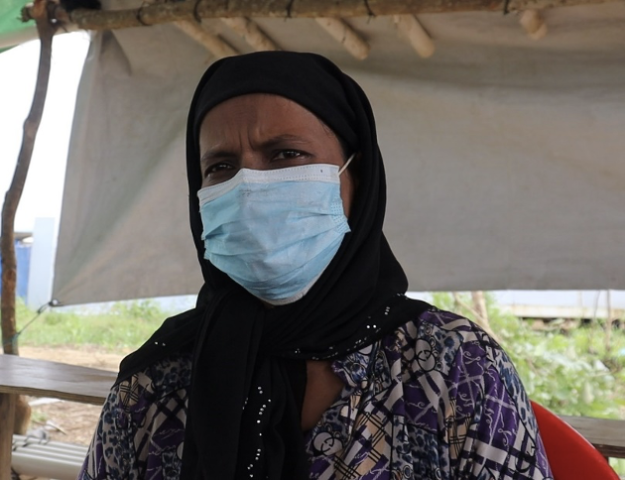An interview with Daw Cho Cho Khaing, a displaced Muslim woman, on the challenges in the IDP camp and the displacement from Maungdaw.
As the conflict in Arakan State continues into its second year, approximately 600,000 people have been forced to flee their homes. These displaced individuals are facing significant challenges across various sectors, including food, medicine, and shelter.
Among those displaced by armed conflict, women face greater physical and mental insecurities and challenges than men.
Since the end of September, fighting between the Arakha Army (AA) and the military council has intensified in Maungdaw, a border town with Bangladesh. Muslims are among those displaced by the violence.
The Development Media Group (DMG) interviewed Daw Cho Cho Khaing, a displaced Muslim woman sheltering in the Hla Phoe Khaing IDP camp, about the challenges faced by Muslim women in the camps, as well as the ongoing conflict in Maungdaw and the displacement situation.
Q: Can you tell us about your experience of displacement from Maungdaw to this place?
A: I lived in Lay Gwa Son in Ward No. 5 in Maungdaw. Three or four soldiers entered my house. When we told them we were leaving, they moved on to the house next door. We decided to leave because the soldiers warned us that the whole village needed to evacuate soon. The soldiers marched toward the town center. I made my way to Pesi village and stayed at a relative’s house. That night, I could hear the sound of heavy shellfire nonstop. It was terrifying. I didn’t dare to stay any longer once the sun rose. When they said that more shelling was coming, we had nowhere to stay or go.
After that, I moved to my grandfather’s house in downtown. The soldiers were firing so heavily that we couldn’t go outside. We weren’t even able to leave to fetch water. Early in the morning, we left the house on foot, traveling through Ward-5. Many others were fleeing as well. I saw many people crying because their children were missing. Eventually, we reached Bar Su Bar. After five days, we planned to move on to Ngwe Taung. Only four members of our family managed to flee.
Other people remain there. We experienced a terrible situation along the way. We had to walk through the meadows. When we reached the road near Atliya village, we met another family. After talking about the reasons for our displacement, we decided to travel together. When we arrived near Bet Kar Bu village, the Arakha Army (AA) gathered a list of displaced people. They asked us where we were coming from, where we were going, and the number of children in our group. Our children were suffering from itching. The number of IDPs in the area had reached around 30. After waiting for some time, the AA gave us a ride in their vehicle.
Q: What difficulties did you face while you were in Maungdaw?
A: The reason we left the town was because the army threatened to fire heavy shells. While I was in the town, it felt like the weapons were falling right over my head. It was terrifying. I saw people killed by the shelling right in front of me.
Q: Can you tell us about the current situation of displacement?
A: We are facing many difficulties because my husband and I have no jobs. The aid we receive at the IDP camp is very limited.
Q: What are the current needs in this camp?
A: I have been here for over two months, and now many people in the camp are sick. They are suffering from skin diseases. They are also suffering from constipation and diarrhea. They feel better after taking oral rehydration solution and medications.
Q: Could you tell me about the status of aid and relief in this camp?
AI don’t know the names of the aid organizations. The first assistance I received was 200,000 kyats, which I got after a photo was taken. Later, I received a parcel containing soaps and cups. I received 200,000 kyats for my four family members, with 50,000 kyats given to each of us. We also received soaps and water purification tablets.
Q: What is the living situation like here in the camp?
A: It’s somewhat comfortable to stay here, and we can make it feel like our own home. However, it is very hot, and there’s nowhere to go. Our livelihood is difficult because we have no jobs. It would be much better if there were job opportunities and more aid for everyone here.
Q: Can you also tell us about the safety concerns and challenges faced by women here?
A: For women, the situation is very difficult, especially for pregnant women. It’s hard for those on family planning when they cannot access injections or pills. We desperately need medicine, particularly for pregnant women. Many displaced people are sick and suffering from itching. There is also a severe lack of clothing in the camp. We were only able to bring two sets of clothes, and there are no clothes for children. At first, we received only three packets of sanitary pads. The security here is weak, and women are particularly vulnerable.
Q: What is the current relation between the Arakanese and Muslim communities?
A: The relationship between the Arakanese and Muslim communities is better than before. People are now speaking to each other more politely. Both communities want to live peacefully. Only then will we achieve success.
Sent by Aung Htein (DMG)

